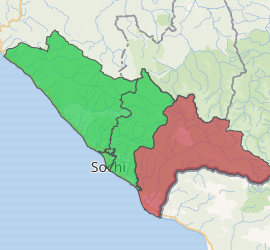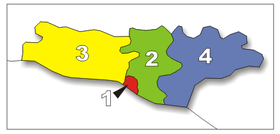Adlersky City District
Adlersky City District (Russian: А́длерский райо́н) is the southernmost of four city districts of the city of Sochi in Krasnodar Krai, Russia, lying along the Black Sea coast near the southern Russian border with Georgia. The city district borders Maykopsky District of Adygea in the north, Mostovsky District of Krasnodar Krai in the east, Abkhazia in the south, and Khostinsky City District in the northwest. In the southwest, it is bordered by the Black Sea. Population: 76,534 (2010 Census);[2] 69,120 (2002 Census);[4] 68,827 (1989 Census).[5] Adlersky District was chosen to host the 2014 Winter Olympics.
Adlersky City District Адлерский внутригородской район | |
|---|---|
The coastal resort of Adler as seen from the Mount Akhun, 9 kilometres (5.6 mi) to the northwest | |
 Coat of arms | |

Adlersky City District in Sochi | |
| Coordinates: 43°26′01″N 39°54′58″E | |
| Country | Russia |
| Federal subject | Krasnodar Krai[1] |
| City | Sochi |
| Established | 10 February 1961 |
| Administrative center | Adler Microdistrict |
| Area | |
| • Total | 1,352 km2 (522 sq mi) |
| Population | |
| • Total | 76,534 |
| • Density | 57/km2 (150/sq mi) |
| Administrative structure | |
| • Administrative divisions | 1 Settlement okrugs, 3 Rural okrugs |
| • Inhabited localities in jurisdiction[1] | 1 Urban-type settlements[3], 29 Rural localities |
The historical center of the district is Adler Microdistrict (А́длер) — formerly classified as a town, but today a microdistrict of Adlersky City District—located at the mouth of the Mzymta River.
History
The settlement was founded by Russians on 18 June 1837 as the fort of Svyatoy Dukh (Holy Spirit). However, this area had been inhabited long before the Russian arrival. During the Middle Ages, it was the site of Liesh, a Sadz Abkhazian village. In the 13th century, the Genoese merchants arrived to establish a factory which became known as Layso. At that time the upland area was controlled by the Sadz princes of Aredba, one of whose principal estates was located within the modern district boundaries. The current name was given to the area by the Ottoman Turks, who called it either Artlar or Artı.
Transportation
Adler is home to the Sochi International Airport, which serves the whole Greater Sochi area.
Adler railway station is also the effective southern terminus of the Russian section of the North Caucasus Railway, which has ceased to carry international traffic to Georgia since hostilities between Russia and Georgia closed the cross-border line in 1992. The summer months see direct train services bringing visitors to Adler from as far away as Berlin in the west (a journey of 3,714 km), Vorkuta in the north (4,286 km away, beyond the Arctic Circle), and Khabarovsk in the Russian Far East, with the 9,816 km of the latter journey taking eight days to complete. Passenger service to Sukhumi starts and stops from time to time.
For the 2014 Winter Olympics, new suburban network was put in operation. There is currently infrequent suburban service to Sochi, with most of the trains stopping also in Khosta and Matsesta, both in Khostinsky City District. The service continues in the direction of Abkhazian border, where trains stop at Olympiyskaya Derevnya railway platform. The service terminates at Olympiysky Park train station. Both the station and the platform were constructed for the Olympics. Furthermore, a connection to the airport is open, with regular service to Sochi through Adler railway station. Finally, a new line was constructed between Adler and Krasnaya Polyana, where some of the Olympic competitions were held, with two railway stations, Esto-Sadok and Roza Khutor. Kudepsta railway platform has been disused. Vesyoloye railway station is only in operation when there is passenger traffic to Abkhazia; at this station, customs and border controls take place.
Buses connect Adler with other localities of the city of Sochi.
Landmarks
The district covers an area of 1,352 square kilometers (522 sq mi) and has under its jurisdiction a network of mountain auls, the Estonian colony at Estosadok, and the ski resort of Krasnaya Polyana which hosted the snow events (alpine and Nordic) of the 2014 Winter Olympics and 2014 Winter Paralympics. The Fisht Olympic Stadium and associated facilities are located closer to the shore.
The landmarks of the former town of Adler include two Russian Orthodox churches, dedicated to the Holy Trinity and the Holy Ghost, as well as the Armenian Saint Sarkis Cathedral.
Apart from a pebbly and narrow beach backed by the railway line, the district also has a municipal historical museum and a dolphinarium, which makes it popular among tourists. It is also possible to visit the largest trout farm in Russia (founded in 1964) and a breeding nursery for great apes.
Among the natural wonders of the district are the 70-metre-high Polikarya waterfall and the Akhshtyr Gorge with a 160-meter-long cave which contains traces of human habitation about 30,000 years ago.
References
- Registry of the Administrative-Territorial Units of Krasnodar Krai
- Russian Federal State Statistics Service (2011). "Всероссийская перепись населения 2010 года. Том 1" [2010 All-Russian Population Census, vol. 1]. Всероссийская перепись населения 2010 года [2010 All-Russia Population Census] (in Russian). Federal State Statistics Service.
- The count of urban-type settlements may include the work settlements, the resort settlements, the suburban (dacha) settlements, as well as urban-type settlements proper.
- Russian Federal State Statistics Service (May 21, 2004). "Численность населения России, субъектов Российской Федерации в составе федеральных округов, районов, городских поселений, сельских населённых пунктов – районных центров и сельских населённых пунктов с населением 3 тысячи и более человек" [Population of Russia, Its Federal Districts, Federal Subjects, Districts, Urban Localities, Rural Localities—Administrative Centers, and Rural Localities with Population of Over 3,000] (XLS). Всероссийская перепись населения 2002 года [All-Russia Population Census of 2002] (in Russian).
- "Всесоюзная перепись населения 1989 г. Численность наличного населения союзных и автономных республик, автономных областей и округов, краёв, областей, районов, городских поселений и сёл-райцентров" [All Union Population Census of 1989: Present Population of Union and Autonomous Republics, Autonomous Oblasts and Okrugs, Krais, Oblasts, Districts, Urban Settlements, and Villages Serving as District Administrative Centers]. Всесоюзная перепись населения 1989 года [All-Union Population Census of 1989] (in Russian). Институт демографии Национального исследовательского университета: Высшая школа экономики [Institute of Demography at the National Research University: Higher School of Economics]. 1989 – via Demoscope Weekly.
External links
| Wikimedia Commons has media related to Adlersky District. |
